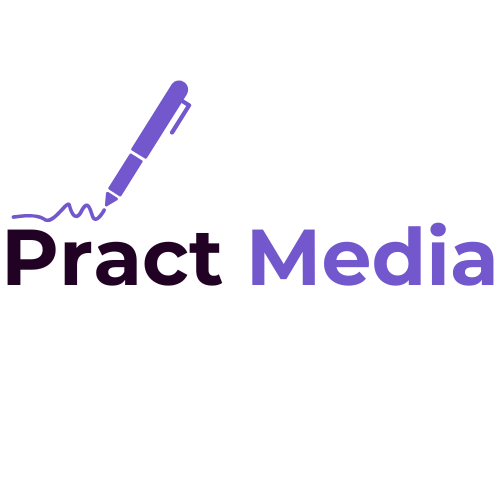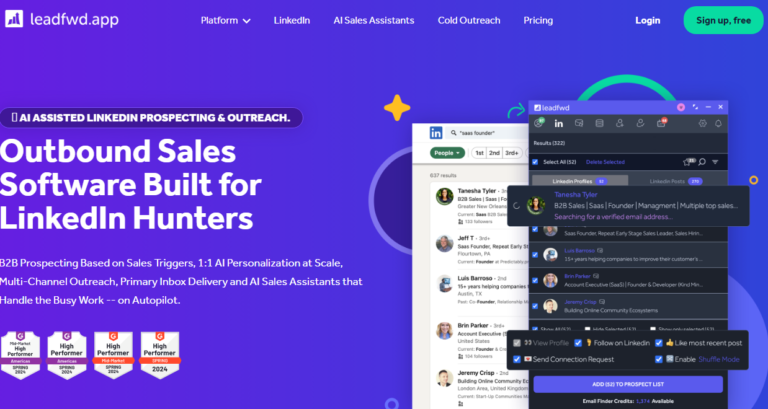B2B Lead Generation For Companies: A Comprehensive Guide
Lead generation is the lifeblood of any B2B (business-to-business) company.
Unlike B2C (business-to-consumer) companies, where sales are often quick and transactional,
B2B sales are complex and involve multiple stakeholders.
This makes generating high-quality leads essential for the success of any B2B company.
In this article, we’ll dive deep into Lead generation for B2B companies
Covering everything from the basics to advanced strategies.
What is B2B Lead Generation?
Definition and Overview

B2B lead generation refers to the process of identifying and attracting potential clients or businesses that may be interested in your products or services.
These leads are then nurtured through various strategies until they are ready to purchase.
Key Differences Between B2B and B2C Lead Generation
The primary difference between B2B and B2C lead generation lies in decision-making.
B2B sales cycles are typically longer and involve more decision-makers.
As a result, B2B lead generation strategies are more complex and require a more personalized approach.
Types of B2B Leads
Marketing Qualified Leads (MQLs)
MQLs are leads that have shown interest in your marketing efforts,
such as downloading a whitepaper or attending a webinar.
While they are interested, they may not yet be ready to purchase.
Sales Qualified Leads (SQLs)
SQLs are leads vetted by the sales team and are considered ready for direct sales
outreach. These leads are often more engaged and interested in your product or service.
Product Qualified Leads (PQLs)
PQLs are leads that have interacted with your product in some way,
such as through a free trial.
They have firsthand experience with your product and are more likely to convert into paying customers.
The B2B Lead Generation Process
Identifying Target Audience
Identifying your target audience is the first step in any successful B2B lead generation campaign.
This involves creating detailed buyer personas based on factors such as industry,
job title, company size, and pain points.
Developing a Value Proposition

Your value proposition is what sets you apart from the competition.
It should communicate the benefits of your product or service and why potential clients should choose you over others.
Creating Lead Magnets
Lead magnets are valuable resources offered in exchange for contact information.
Examples include eBooks, whitepapers, webinars, and case studies.
These resources should address the pain points of your target audience and position your company as a thought leader in the industry.
Lead Nurturing Strategies
Once you’ve captured a lead, nurturing them through the sales funnel is the next step.
This involves providing relevant content and engaging with them regularly to keep your brand in mind.
Top Channels for B2B Lead Generation
Content Marketing
Content marketing is one of the most effective channels for B2B lead generation.
By creating valuable content that addresses the needs and challenges of your target audience,
you can attract and engage potential leads.
Email Marketing
Email marketing allows you to communicate directly with your leads.
By segmenting your email list and personalizing your messages, you can deliver targeted content that resonates with your audience.
Social Media Marketing
Social media platforms like LinkedIn are powerful tools for B2B lead generation.
You can build relationships and generate leads by sharing valuable content and engaging with your audience.
Search Engine Optimization (SEO)
SEO involves optimizing your website and content to rank higher in search engine results.
By targeting relevant keywords and creating high-quality content,
you can attract organic traffic and generate leads.
Pay-Per-Click Advertising (PPC)
PPC advertising allows you to reach your target audience through paid ads on search engines and social media platforms.
You can drive targeted traffic to your website by bidding on relevant keywords.
Webinars and Events
Webinars and events are excellent opportunities
to showcase your expertise and engage with potential leads.
You can generate high-quality leads by offering valuable insights and interacting with attendees.

Best Practices for B2B Lead Generation
Personalization and Segmentation
Personalization is critical to successful B2B lead generation.
You can increase engagement and conversion rates
by segmenting your audience and tailoring your messages to their needs.
Leveraging Data and Analytics
Data and analytics are crucial for optimizing your lead-generation efforts.
You can make data-driven decisions to improve your campaigns by tracking key metrics and analyzing your results.
Aligning Sales and Marketing Teams
Aligning your sales and marketing teams is essential for effective lead generation.
By working together and sharing insights, you can ensure a seamless transition from lead generation to sales.
Optimizing Lead Conversion Rates
Optimizing your lead conversion rates involves testing and refining your strategies to improve the percentage of leads that convert into customers.
This can include A/B testing, optimizing your landing pages, and refining your sales pitch.
Tools and Software for B2B Lead Generation
Customer Relationship Management (CRM) Tools
CRM tools help you manage and track your interactions with leads.
They allow you to store contact information, track communication history, and manage your sales pipeline.
Marketing Automation Tools
Marketing automation tools allow you to automate repetitive tasks such as email marketing, social media posting, and lead nurturing.
This saves time and ensures consistent communication with your leads.
Lead Scoring Tools
Lead scoring tools help you prioritize your leads based on their conversion likelihood.
By assigning scores to leads based on their behavior and engagement,
you can focus your efforts on the most promising prospects.
Analytics Tools
Analytics tools allow you to track the performance of your lead-generation campaigns.
By analyzing key metrics such as website traffic, conversion rates, and ROI,
you can optimize your strategies for better results.
Challenges in B2B Lead Generation
Quality vs. Quantity of Leads
One of the biggest challenges in B2B lead generation is balancing the quality and quantity of leads.
While generating a high volume of leads is essential,
ensuring that those leads are qualified and likely to convert is equally important.
Long Sales Cycles
B2B sales cycles are typically longer than B2C ones,
making keeping leads engaged over time challenging.
To move leads through the sales funnel, consistent communication and nurturing are required.
Maintaining Consistent Communication
Maintaining consistent communication with leads is crucial for keeping your brand at the forefront of your mind.
This can be challenging, especially when dealing with a large volume of leads,
but it’s essential for successful lead generation.
Measuring Success in B2B Lead Generation
Key Performance Indicators (KPIs)
KPIs are metrics used to measure the success of your lead generation efforts.
Common KPIs include the number of leads generated, conversion rates, and the cost per lead.
Tracking ROI
Tracking ROI is essential for understanding the effectiveness of your lead generation campaigns.
By comparing the cost of your campaigns to the revenue generated,
you can determine the profitability of your efforts.
Regular Reporting and Analysis
Regular reporting and analysis are crucial for optimizing your lead generation strategies.
You can continuously improve your campaigns by reviewing your results and making data-driven decisions.
Case Studies of Successful B2B Lead Generation
Case Study 1: SaaS Company
A SaaS company used content marketing and SEO to generate high-quality leads.
By creating in-depth blog posts and optimizing their website for relevant keywords,
they were able to attract and convert a steady stream of leads.
Case Study 2: Manufacturing Firm
A manufacturing firm used LinkedIn and email marketing to generate leads from its target audience.
By sharing industry insights and offering personalized solutions,
it built relationships and generated qualified leads.
Case Study 3: Consulting Business
A consulting business used webinars and events to generate leads.
By offering valuable insights and engaging with attendees,
they were able to attract high-quality leads and convert them into clients.
Emerging Trends in B2B Lead Generation
AI and Machine Learning
AI and machine learning transform B2B lead generation
by enabling more personalized and targeted campaigns. These technologies can analyze vast amounts of data to identify patterns and predict lead behavior.
Account-Based Marketing (ABM)
ABM is a targeted approach to B2B lead generation that focuses on specific accounts rather than broad audiences.
This allows for more personalized and effective campaigns.
Video Marketing
Video marketing is becoming increasingly popular in B2B lead generation.
Videos are an engaging and effective way to communicate your message and connect with your audience.
Conclusion
Lead generation is a critical component of any B2B company’s success.
By understanding the process, leveraging the proper channels, and using the best practices and tools, you can generate high-quality leads that drive your business forward.
As the landscape of B2B lead generation continues to evolve,
staying up-to-date with the latest trends and strategies will ensure your efforts remain effective and impactful.
FAQs
What is the most effective B2B lead generation strategy?
The most effective strategy often depends on your industry and target audience. However, content marketing, SEO, and personalized email marketing are highly effective.
How can I improve lead quality?
Improving lead quality involves targeting the right audience, using lead scoring tools, and refining your lead nurturing strategies to focus on those most likely to convert.
What tools are essential for B2B lead generation?
Essential tools include CRM software, marketing automation tools, lead scoring systems, and analytics platforms to track and optimize your campaigns.
How long does it take to see results from B2B lead generation?
The timeline varies depending on the strategy and industry, but it typically takes several months to see significant results from B2B lead generation efforts.
What are the common mistakes in B2B lead generation?
Common mistakes include not clearly defining your target audience, neglecting to align sales and marketing teams, and failing to nurture leads through the sales funnel.







